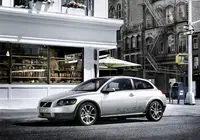Volvo Expanding Range Of Bioethanol-Powered FlexiFuel Cars
GOTHENBURG - November 8, 2006: Volvo Cars is launching FlexiFuel models powered by renewable bioethanol on several European markets this autumn. The green model range is also being extended and even Volvo’s new C30 will be offered with eco-optimised FlexiFuel power.
 Volvo C30 FlexiFuel |
 Volvo S40 FlexiFuel |
Volvo Cars predicts sales of 7,000 FlexiFuel cars in 2007. Most are expected to be sold in Sweden.
Environmental benefits Ethanol is an entirely renewable fuel and can in principle be produced from just about any biomass source, such as corn, wheat, sugar-beet and cellulose. If the car is run on E85, which is the fuel available at the pumps, emissions of fossil carbon dioxide, a greenhouse gas, drop by up to 80% compared with the same car running only on petrol. ”A renewable fuel will not on its own be able to replace today’s fossil fuels, and the range of alternative fuels will probably be far wider in the future. Many different fuels and technologies will therefore be developed in parallel. Ethanol reduces dependency on fossil fuels and Volvo’s FlexiFuel programme thus makes a vital contribution to our strategy of environmental sustainability,” concludes Gerry Keaney.
TECHNICAL SPECIFICATIONS
Engine: Four-cylinder petrol/E85 engine
Gearbox: Five-speed manual
Max power output: 92 kW (125 hp)
Max torque: 165Nm at 4000 revs/minute
Acceleration 0-100 km/h in seconds: 10.8 (C30), 10.9 (S40), 11.0 (V50)
Top speed: 200 km/h
Fuel consumption litres/100 km (petrol power): 7.3 (C30), 7.4 (S40), 7.4 (V50)
Carbon dioxide emissions CO2 g/km (petrol power):
174 (C30), 177 (S40), 177 (V50)
Regarding fuel consumption and carbon dioxide emissions: the figures relate to running on 100% petrol (the certification fuel). Fuel consumption when running on E85 bioethanol is about 40% higher since the energy content of ethanol is lower than that of petrol.



